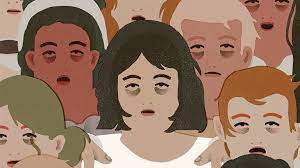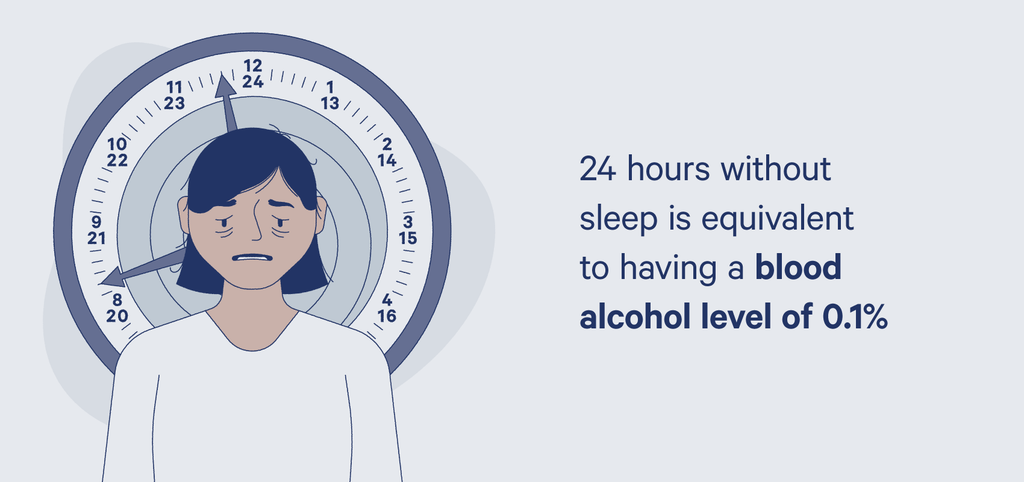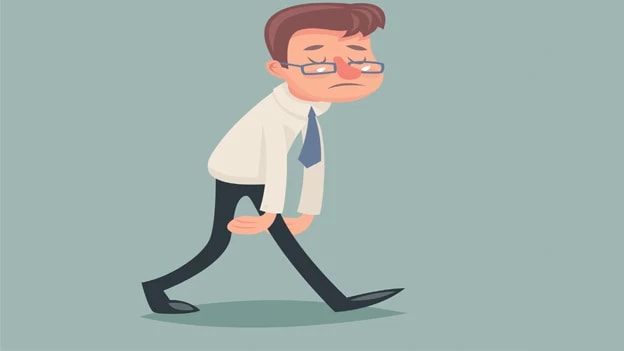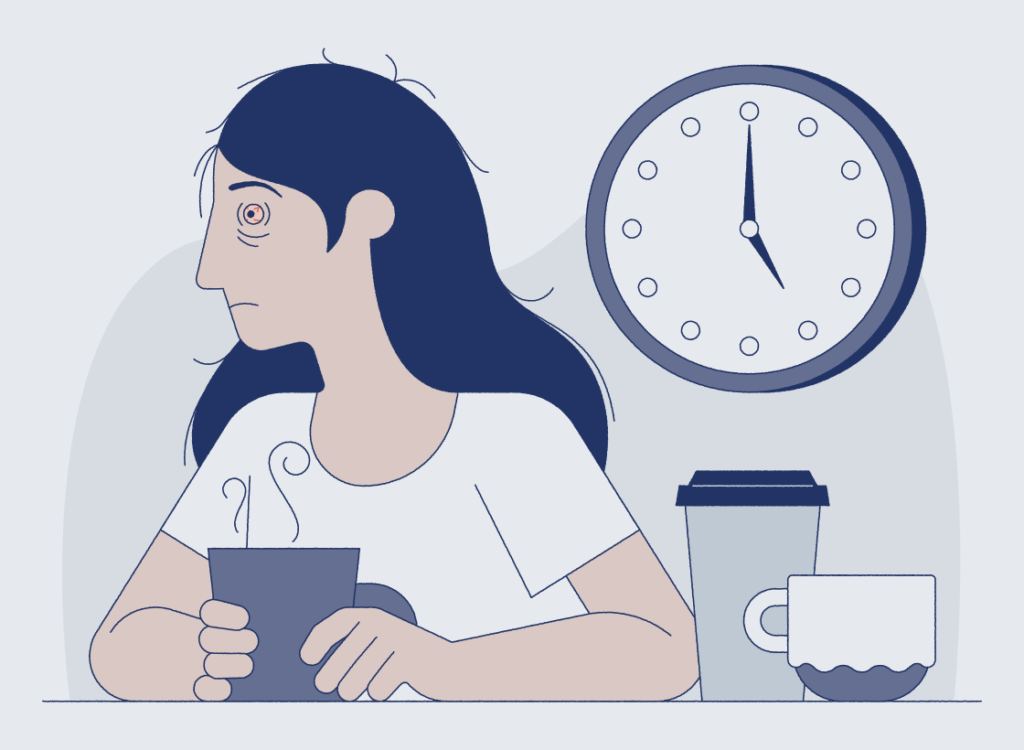If you are reading this article, likely, you are not getting enough sleep at night. Sleep deprivation can have several adverse effects on both your physical and mental health. So it is important to get the right amount of rest every day. This blog post will cover topics related to sleep deprivation symptoms, causes, prevention/addressing solutions, and when to call a doctor.
Contents
What Is Sleep Deprivation?

Sleep deprivation is a condition that occurs when you don’t get the amount of sleep that your body needs. It can be caused by different things, such as not having enough time to sleep, sleeping at odd times, drinking alcohol or caffeine before bed, stress, and health problems.
How Much Sleep Is Enough?

However, this number varies depending on the person’s age and activity level.
- On average, most adults need around seven to nine hours of sleep each night.
- For children ages five to 12 years old, it is recommended that they get at least ten hours of sleep per 24 hour period.
- Teenagers should aim for eight to ten hours
- 18-year-olds should get at least seven hours of sleep
How Does Sleep Deprivation Affect The Brain?
The most common effects that sleep deprivation has on the brain are:
- Attention problems, such as struggling to focus or complete tasks. This can make it more difficult for you to do your job and be productive at work.
- Memory issues, which may cause you to forget important things like where you put something or what time you have to be somewhere.
- Having trouble paying attention and staying awake, which can increase your likelihood of being in a car accident or having an accident at work.
Causes of Sleep Deprivation
There are many causes of sleep deprivation, which can be categorized into three main groups:
Behavioral Causes
These include things like working long hours, taking care of a young child or an elderly parent overnight, watching television or using the computer in bed before going to sleep, and having irregular sleep patterns.
Medical Causes
These include conditions such as:
- Sleep apnea,
- Restless leg syndrome (RLS),
- Narcolepsy, and
- Insomnia
Environmental Causes
These include:
- Extreme temperatures in the bedroom,
- Light pollution from streetlights or other outdoor light sources shining into your bedroom at night, and noise disturbances
Signs and Symptoms of Sleep Deprivation
There are many signs and symptoms of sleep deprivation, which can differ from person to person.
Common Symptoms
- Feeling tired throughout the day,
- Having trouble concentrating or staying focused,
- Being irritable or moody,
- Falling asleep during the day, and
- Struggling to remember things
Physical symptoms
- Headaches,
- Lack of energy or motivation, and
- Upset stomach
Mental Symptoms
- Difficulty making decisions,
- Memory loss or poor memory recall, and
- Mental fogginess
Stages Of Sleep Deprivation
There are three different stages of sleep deprivation:
Mild
This is when you don’t get the recommended amount of sleep for your age group. You may feel more irritable and have trouble focusing.
Moderate
This is when you don’t get the recommended amount of sleep, plus you experience symptoms such as hallucinations or paranoia.
Severe
This is when you don’t get any sleep for two or more days. You will likely experience extreme confusion, hallucinations, and paranoia.
The Ill Effects of Sleep Deprivation

Many ill effects can come from sleep deprivation.
Short-term symptoms
- Depression,
- weight gain,
- irritability or mood swings,
- trouble thinking clearly or problem-solving, and
- memory problems
Long-term symptoms
- Obesity,
- Heart Disease,
- Type II Diabetes,
- Alzheimer’s Disease or dementia,
- Increased car accidents due to fatigue behind the wheel, and depression
On Physical Health
Sleep deprivation can take a toll on your physical health – it has been linked with an increased risk for:
- Heart disease,
- Obesity,
- Diabetes,
- High blood pressure (hypertension),
- Stroke,
- Kidney diseases or failure and even
- Cancer
NOTE: It can also weaken your immune system, making you more susceptible to colds and other infections.
On Mental Health
Sleep deprivation can lead to several mental health problems, such as:
- Anxiety,
- Depression and
- Bipolar disorder.
- Worsen the symptoms of ADHD and schizophrenia
NOTE: In addition, lack of sleep has been linked with suicide.
Prevention And Management

Prevention Of Sleep Deprivation Symptoms
There are many ways that you can prevent sleep deprivation.
Behavioral Changes
- Make sure that you get enough hours of sleep,
- going to bed and waking up at the same time every day,
- avoiding caffeine and alcohol before bed,
- using the bedroom only for sleeping and sex, and
- reserving the use of electronic devices for outside of the bedroom
Environmental Changes
Make sure your bedroom is dark enough (using blackout curtains or an eye mask), cool enough (keeping the room at a comfortable temperature), and as quiet as possible – using a fan to drown out noise or a “white noise” machine.
Management Of Sleep Deprivation symptoms
If you are experiencing symptoms of sleep deprivation, there are a few things you can do to address the issue:
- Talk to your doctor about any medical conditions that may be causing the problem,
- Create and stick to a regular sleep schedule as best as possible,
- Avoid caffeine and alcohol before bedtime,
- Establish a relaxing bedtime routine,
- Designate certain times during the day as “screen-free,” and
- Make sure your bedroom is dark, quiet, and at a comfortable temperature
Management Of Insomnia
If you are struggling with insomnia, there are a few things that you can do to help improve your sleep, such as:
- Establishing a bedtime routine,
- Using relaxation techniques before bed, and
- Avoiding watching television or working on the computer in bed
For Medical Conditions
If you have a medical condition that is causing your sleep problems, you must talk to your doctor and find a treatment plan that works for you.
When To Call The Doctor?

If you are experiencing any of these conditions or symptoms it may be time to call the doctor:
- Frequent daytime sleepiness for three months or more,
- Trouble staying asleep or falling asleep for more than one month,
- Having trouble concentrating or staying focused for more than three months, and
- Experiencing mood swings or drastic changes in behavior for no apparent reason
Conclusion
Sleep deprivation can have a serious impact on your physical and mental health. It is important to be aware of the signs and symptoms of sleep deprivation, as well as the possible causes of it. You can take certain steps both short and long term to reduce the impact of sleep deprivation on your life.
Although there is no one size fits all solution, by making some changes in your lifestyle you may be able to get better quality rest at night which will continue to improve your overall health and well-being. If you’re experiencing any of these symptoms regularly, then it’s important to see your doctor.
For more information, please contact MantraCare. Sleep is an essential part of our daily routine and it plays a significant role in maintaining a healthy body and mind. If you have any queries regarding Online Insomnia Counseling experienced therapists at MantraCare can help: Book a trial therapy session


